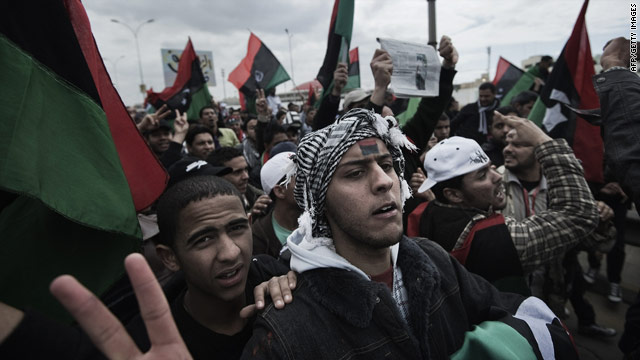Arab League WILL back a Libyan no-fly zone
Cairo, Egypt (CNN) -- Arab League officials convened Saturday to vote on backing a no-fly zone in Libya, where a civil war is being fought between forces loyal to leader Moammar Gadhafi and a tenacious opposition movement.
The officials, who represent Arab nations in the Middle East and North Africa, also are considering recognition of the opposition's Transitional National Council as the sole legitimate representative of Libya.
Opposition forces made strides in the early days of the rebellion, but Gadhafi's military has recently gained strong momentum.
The military has been pounding the key oil port of Ras Lanuf, once in the hands of rebel forces. The Gadhafi government appears intent on retaking all territory from the opposition despite growing international pressure.




The league was meeting at its headquarters in Cairo, while hundreds of demonstrators outside urged the international community to step up support for Libyan opposition groups.
Pleading for international help as they continue to lose ground to pro-Gaddafi forces, rebels are asking for a no-fly zone that would theoretically thwart airstrikes.
No-fly zones are areas where aircraft are not allowed to fly. Such zones were put in place after the Gulf War in southern and northern Iraq as a check on the forces of the late Iraqi leader Saddam Hussein.
Western powers have said any action by the international community, including a no-fly zone, would have to have regional support and a clear mandate from the United Nations.
U.S. President Barack Obama said on Friday that he "won't take (the) decision lightly" on whether to use military force, including helping to enforce a no-fly zone, saying it is critical to "balance costs versus benefits."
While France has recognized the National Transitional Council as the sole representative of the Libyan people, the European Union was more restrained Friday, saying it "welcomes and encourages the interim transitional national council based in Benghazi, which it considers a political interlocutor."
German Chancellor Angela Merkel was even more cautious in her approach to the council, calling it a possible interlocutor.
French President Nicolas Sarkozy said in a news conference in Brussels, Belgium, on Friday that "we consider the National Council based in Benghazi as the proper interlocutors for Libya and they need to be recognized as such and encouraged."
